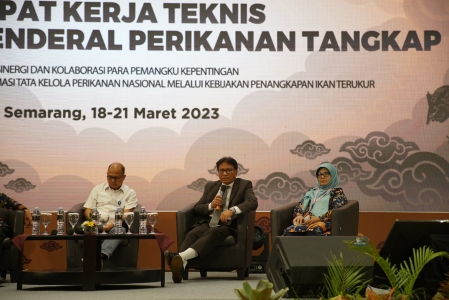Prof Tri Wiji Nurani’s Contributing Ideas for Measurable Fishing Policy

IPB University academic, Prof Tri Wiji Nurani was also present as a resource person in the 'Socialization and Establishing Synergy and Gathering Input in the Implementation of Measured Fishing Policy' activities organized by the Directorate General of Captured Fisheries, Ministry of Maritime Affairs and Fisheries (KKP) at Gumaya Tower Hotel Semarang, (18-21/3).
On this occasion, Prof Tri delivered the material 'Theory and Practices of Sustainable Management of Fish Resources through the Application of a Fishing Quota System'.
"Fisheries management according to theory includes controlling inputs through regulating fishing units and controlling output through managing catches," said the Professor of IPB University from the Faculty of Fisheries and Marine Sciences (FPIK).
In addition, continued Prof Tri, fisheries management can be carried out with a technical approach (technical measures), for example through regulation of fishing seasons and economic instruments such as subsidies, taxes (indirect economic instruments).
“Indonesia has implemented various forms of management. Various fisheries development concepts have been rolled out, such as minapolitan, industrialization of fisheries, management of fisheries based on fisheries management areas (WPP) and lastly, measurable fishing," she added. Basically, the concept has the same goal, namely within the framework of utilizing and managing fish resources (SDI) optimally in a sustainable manner.
Prof Tri added, governance in the implementation of the quota system in Indonesia can follow what has been implemented by the Commission for the Conservation of Southern Bluefin Tuna (CCSBT) in the management of the southern bluefin tuna fishery.
However, the challenge is that Indonesia has a very large water area with various types of fish. Various types of fishing units, capacity and business scale as well as various characteristics of actors and perceptions of SDI are another challenge for current fisheries management in Indonesia.
"The action steps for implementing the quota system include building a catch data collection system. Then, build a work unit to monitor quota utilization," said Prof Tri.
The next step, she said, is to build user-friendly data reporting procedures, then create effective policies and regulations. "Finally, by increasing the capacity of fishermen/fishing industry players and honesty in making catch reports," she concluded. (*/Rz) (IAAS/BKU)


